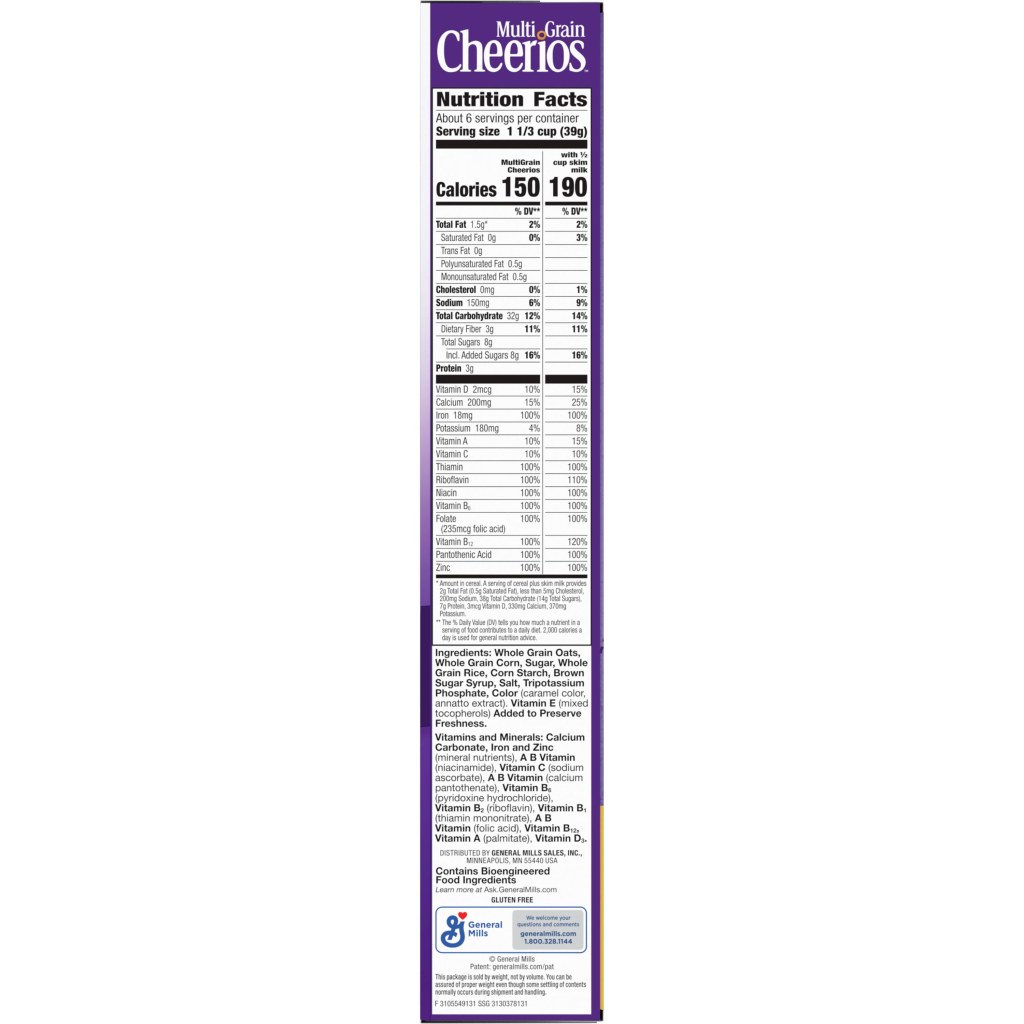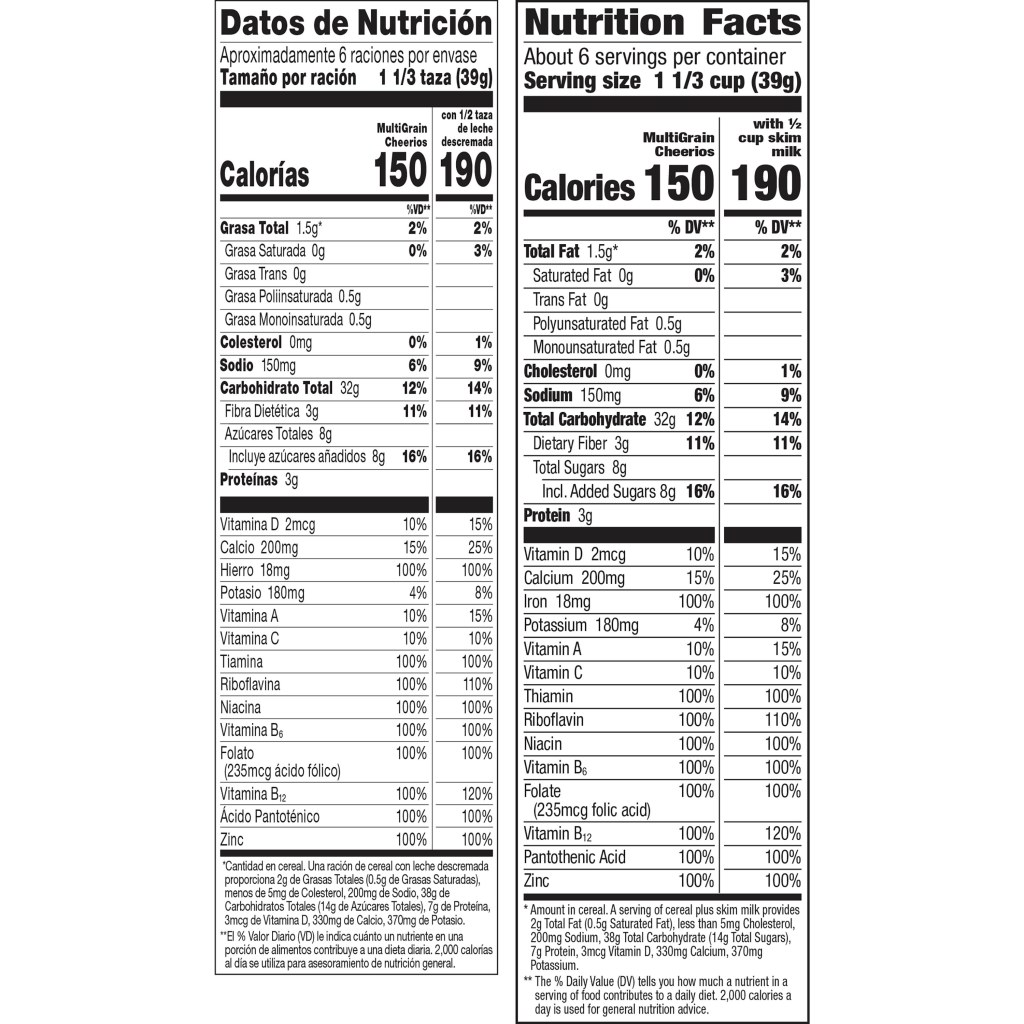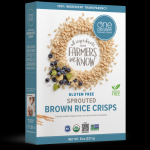Discover The Power-Packed Multigrain Cereal Nutrition Facts: Unleash Your Health Potential Today!
Multigrain Cereal Nutrition Facts: A Complete Guide to a Healthy Breakfast
Welcome, Cereal Connoisseur, to a comprehensive guide on multigrain cereal nutrition facts. In today’s fast-paced world, it’s crucial to start your day with a nutritious and wholesome breakfast. Multigrain cereals offer a perfect solution, packed with a variety of grains that provide essential nutrients and energy to kickstart your day.
Introduction
1. What are Multigrain Cereals?
2 Picture Gallery: Discover The Power-Packed Multigrain Cereal Nutrition Facts: Unleash Your Health Potential Today!


Multigrain cereals are a combination of various grains, such as oats, barley, rice, corn, wheat, and more. These cereals provide a diverse range of nutrients, including fiber, vitamins, and minerals, making them an excellent choice for a balanced breakfast.

Image Source: cloudinary.com
2. Who Can Benefit from Multigrain Cereals?
Anyone looking to improve their overall health and well-being can benefit from incorporating multigrain cereals into their diet. Whether you’re a fitness enthusiast, a busy professional, or simply someone who cares about their nutrition, multigrain cereals offer a wide range of advantages.
3. When Should You Enjoy Multigrain Cereals?

Image Source: cloudinary.com
The ideal time to enjoy multigrain cereals is during breakfast. Starting your day with a nutritious meal is essential in providing sustained energy levels and promoting better focus and productivity throughout the day.
4. Where Can You Find Multigrain Cereals?
Multigrain cereals are widely available in supermarkets, health food stores, and online platforms. You can choose from various brands and flavors to suit your taste preferences and dietary requirements.
5. Why Should You Choose Multigrain Cereals?
There are several reasons why multigrain cereals are a smart choice for your breakfast:
High Nutritional Value:
Multigrain cereals offer a wide range of nutrients, including dietary fiber, vitamins, minerals, and antioxidants. These nutrients are essential for maintaining overall health and preventing various diseases.
Energy Boost:
With a combination of different grains, multigrain cereals provide a sustained release of energy throughout the day. This helps in improving focus, concentration, and productivity.
Weight Management:
Due to their high fiber content, multigrain cereals help in promoting satiety and preventing overeating. This can be beneficial for those aiming to maintain or lose weight.
Heart Health:
The grains present in multigrain cereals contain heart-healthy nutrients, such as soluble fiber and antioxidants. Regular consumption of multigrain cereals can help in reducing the risk of heart disease.
Digestive Health:
The fiber content in multigrain cereals promotes healthy digestion, prevents constipation, and maintains a healthy gut microbiome.
6. How Should You Incorporate Multigrain Cereals into Your Diet?
There are several ways to enjoy multigrain cereals:
– Have a bowl of multigrain cereal with milk or yogurt for a complete breakfast.
– Add multigrain cereal to smoothies or yogurt bowls for an extra crunch and nutritional boost.
– Use multigrain cereal as a topping for pancakes, waffles, or desserts for added texture and flavor.
Advantages and Disadvantages of Multigrain Cereal Nutrition Facts
Advantages:
1. Nutrient-Rich:
Multigrain cereals provide a wide range of essential nutrients, including fiber, vitamins, and minerals, which contribute to overall health and well-being.
2. Energy Boost:
The combination of grains in multigrain cereals provides a sustained release of energy, keeping you fueled and focused throughout the day.
3. Weight Management:
The high fiber content in multigrain cereals promotes satiety, helping in weight management and preventing overeating.
4. Heart Health:
The heart-friendly nutrients present in multigrain cereals, such as soluble fiber and antioxidants, contribute to a healthy cardiovascular system.
5. Digestive Health:
The fiber content in multigrain cereals aids in maintaining a healthy digestive system and preventing constipation.
Disadvantages:
1. Added Sugar:
Some brands of multigrain cereals may contain added sugar, which can be detrimental to health if consumed in excess. It’s important to choose cereals with minimal added sugars or opt for unsweetened varieties.
2. Allergies or Sensitivities:
Individuals with specific grain allergies or sensitivities should be cautious while choosing multigrain cereals. It’s essential to read the ingredient labels carefully and opt for alternatives if needed.
3. Portion Control:
While multigrain cereals offer numerous health benefits, it’s crucial to practice portion control. Overconsumption can lead to an excessive calorie intake, which may be counterproductive, especially for individuals aiming to lose weight.
Frequently Asked Questions (FAQs)
1. Are multigrain cereals suitable for individuals with gluten intolerance?
Yes, multigrain cereals are suitable for individuals with gluten intolerance as long as they are labeled gluten-free. Look for certified gluten-free products to ensure they meet your dietary restrictions.
2. Can multigrain cereals help with weight loss?
Yes, multigrain cereals can be beneficial for weight loss due to their high fiber content, which promotes satiety and prevents overeating. However, it’s essential to practice portion control and choose cereals with minimal added sugars.
3. Can multigrain cereals be enjoyed as a snack?
Absolutely! Multigrain cereals can be a healthy snack option, especially when consumed in their dry form. They provide a crunchy and nutritious alternative to processed snacks.
4. Are multigrain cereals suitable for children?
Multigrain cereals can be a nutritious option for children, providing essential nutrients and energy for their growing bodies. However, it’s important to choose cereals with minimal added sugars and monitor portion sizes.
5. Can I make my own multigrain cereal at home?
Yes, you can create your own multigrain cereal at home by combining various grains of your choice. This allows you to have full control over the ingredients and customize the flavor to suit your preferences.
Conclusion
Incorporating multigrain cereals into your breakfast routine can significantly improve your overall health and well-being. With their high nutritional value, energy-boosting properties, and numerous health benefits, multigrain cereals are an excellent choice for individuals of all ages. Remember to choose cereals with minimal added sugars, practice portion control, and enjoy the many flavors and variations available. Start your day right with a bowl of multigrain cereal and fuel yourself for success!
Final Remarks
Disclaimer: The information provided in this article is for educational purposes only and should not replace professional medical advice. If you have any underlying health conditions or dietary restrictions, it is advisable to consult with a healthcare professional or registered dietitian before making any significant changes to your diet.
This post topic: Cereal



